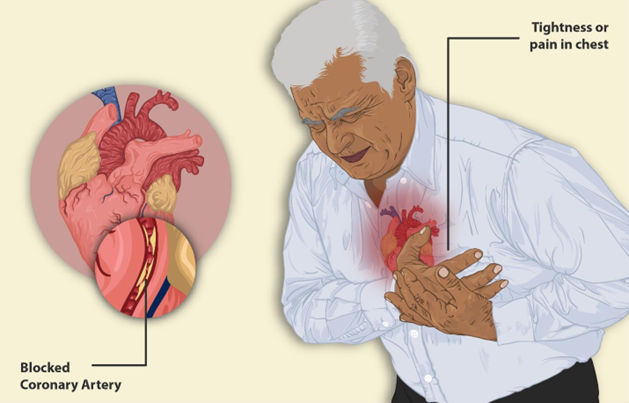The nurse is developing a plan of care for an older client with hypertension who reports chest pain on exertion. Which outcome should the nurse include in the plan of care for this client?

The nurse will call the client weekly to monitor the client's blood pressure and symptoms.
The nurse will encourage the client to walk thirty minutes every day.
The client will take up to 4 nitroglycerine tablets sublingually for chest pain.
The client will record episodes of angina and self-management for one week.
The Correct Answer is D
Choice A rationale:
Weekly monitoring of blood pressure and symptoms is important but does not address the specific issue of chest pain on exertion.
Choice B rationale:
Encouraging daily walking is generally a good recommendation for overall health but does not address the immediate concern of chest pain.
Choice C rationale:
Taking up to 4 nitroglycerine tablets for chest pain may provide temporary relief, but this should be done under the guidance of a healthcare provider and is not a long-term outcome.
Choice D rationale:
Recording episodes of angina and self-management for one week is a specific and appropriate outcome to monitor the client's chest pain and response to interventions.
Nursing Test Bank
Naxlex Comprehensive Predictor Exams
Related Questions
Correct Answer is {"A":{"answers":"A"},"B":{"answers":"A"},"C":{"answers":"A"},"D":{"answers":"A"},"E":{"answers":"A"},"F":{"answers":"None"},"G":{"answers":"None"}}
Explanation
Choice A rationale:
This is included because the client has a history of cardiovascular issues (hypertension, coronary artery disease), and the symptoms presented (fatigue, muscle cramps, tingling sensation, lightheadedness) could be related to cardiac concerns. Monitoring cardiac status helps assess for any cardiac-related issues.
Choice B rationale:
This is essential because the client's recent illness and missed dialysis sessions may have contributed to her symptoms. Ensuring the client understands the importance of compliance with hemodialysis is crucial for her overall well-being.
Choice C rationale:
Monitoring vital signs, including blood pressure, heart rate, and respiratory rate, is a fundamental aspect of assessing the client's current condition and response to treatment.
Choice D rationale:
A comprehensive head-to-toe assessment helps identify any physical signs or symptoms that may be contributing to the client's complaints and guides further evaluation and interventions.
Choice E rationale:
Given the client's history of cardiovascular disease and the complaints of chest discomfort, monitoring the heart rhythm is essential to assess for any arrhythmias or irregularities.
Choice F rationale:
Monitoring fluid intake and output is crucial, especially in clients with end-stage renal disease, as imbalances in fluid and electrolytes can exacerbate symptoms and lead to complications.
Choice G rationale:
The client's complaints of muscle cramps and tingling sensations in the arms and legs indicate potential neuromuscular involvement. Monitoring neuromuscular status helps assess these symptoms.
Choice H rationale:
There is no indication in the provided information that an immediate transfer to a telemetry unit is necessary. The client's vital signs, including heart rate and oxygen saturation, are stable at the moment. Further assessment and interventions can be carried out on the current unit before considering a transfer.
Choice I rationale:
Given the client's history of end-stage renal disease and the symptoms presented, educating her to avoid a high-potassium diet is important. High potassium levels can lead to symptoms like muscle cramps and tingling sensations, which the client is experiencing.
Correct Answer is ["A","B","C"]
Explanation
The assessment findings that require immediate follow-up by the nurse are: muscle cramps, tingling sensation in arms and legs, and lightheadedness.
These are signs of electrolyte imbalance, which can be caused by missed dialysis sessions, dehydration, or infection. Electrolyte imbalance can lead to serious complications such as cardiac arrhythmias, seizures, or coma.
The nurse should monitor the client's vital signs, neurological status, and cardiac rhythm, and notify the physician for further orders. The nurse should also assess the client's fluid status, hydration, and nutritional intake, and provide education on the importance of adhering to the dialysis schedule and dietary restrictions.
Whether you are a student looking to ace your exams or a practicing nurse seeking to enhance your expertise , our nursing education contents will empower you with the confidence and competence to make a difference in the lives of patients and become a respected leader in the healthcare field.
Visit Naxlex, invest in your future and unlock endless possibilities with our unparalleled nursing education contents today
Report Wrong Answer on the Current Question
Do you disagree with the answer? If yes, what is your expected answer? Explain.
Kindly be descriptive with the issue you are facing.
